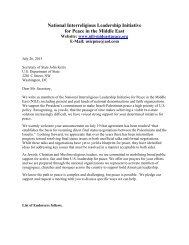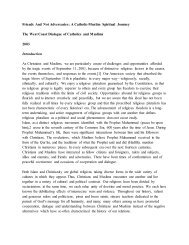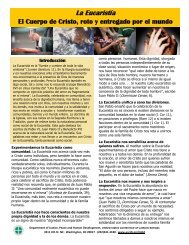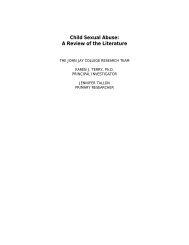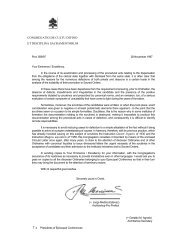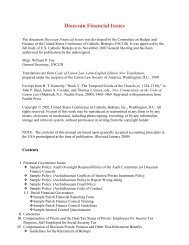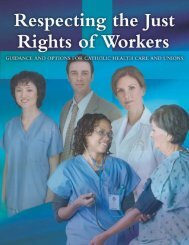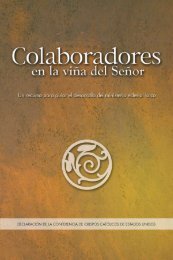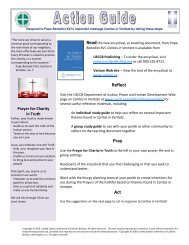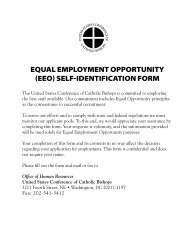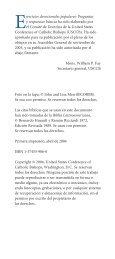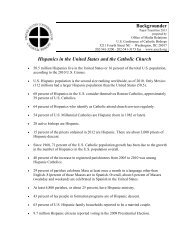Doctrinal Elements of a Curriculum Framework for the Development ...
Doctrinal Elements of a Curriculum Framework for the Development ...
Doctrinal Elements of a Curriculum Framework for the Development ...
- No tags were found...
You also want an ePaper? Increase the reach of your titles
YUMPU automatically turns print PDFs into web optimized ePapers that Google loves.
Option C: Living as a Disciple <strong>of</strong> Jesus Christ in SocietyThe purpose <strong>of</strong> this course is to introduce students to <strong>the</strong> Church’s social teaching. In this course, students are to learnhow Christ’s concern <strong>for</strong> o<strong>the</strong>rs, especially <strong>the</strong> poor and needy, is present today in <strong>the</strong> Church’s social teaching and mission.I. God’s Plan <strong>for</strong> His PeopleVatican II: The Church is a sign and instrument <strong>of</strong> communionwith God and <strong>the</strong> unity <strong>of</strong> <strong>the</strong> whole human race(LG, no. 1).A. Salvation and truth (CCC, no. 851).1. Redemption through <strong>the</strong> Paschal Mystery.2. Eternal life with <strong>the</strong> Triune God in heaven.B. Happiness in this life (CCC, no. 1718).1. Happiness is a shared communion with God.a. Trinitarian communio is <strong>the</strong> pattern <strong>for</strong> sociallife (CCC, nos. 267, 738, 1693).b. Witness Christ in words and actions.2. The unity <strong>of</strong> <strong>the</strong> whole human race (CCC, nos.842, 1877).a. The social nature <strong>of</strong> <strong>the</strong> human person (CCC,nos. 1878-1889, 1929).b. The need <strong>for</strong> o<strong>the</strong>rs.3. The household <strong>of</strong> faith—Church as <strong>the</strong> following:a. Mystical Body <strong>of</strong> Christ (CCC, nos. 774-779,787-796, 805-807, 872, 1123, 1396, 1548,2003).b. Family <strong>of</strong> God (CCC, no. 2790).c. Community <strong>of</strong> sanctified believers (CCC,no. 824).d. Teacher: <strong>for</strong>ms <strong>the</strong> social conscience <strong>of</strong> society.e. Listener: ecumenism.II. Social Teaching <strong>of</strong> <strong>the</strong> ChurchA. Church always has stood <strong>for</strong> charity and justice (CCC,no. 953).1. Social teachings in Scripture.a. Amos and Isaiah.b. The Sermon on <strong>the</strong> Mount; Last Judgment(CCC, nos. 2153, 2262, 2336, 2605, 2830).c. Communal sharing, deacons, collections<strong>for</strong> churches.2. Church’s history <strong>of</strong> social concern.3. Corporal and spiritual works <strong>of</strong> mercy(CCC, no. 2447).B. Different types <strong>of</strong> justice (CCC, nos. 2411-2412, 1807).1. Distributive justice (CCC, nos. 2236-2411).2. Legal justice.3. Commutative justice.4. Social justice (CCC, nos. 1928-1942).C. Social teaching in <strong>the</strong> modern era.1. Pope Leo XIII: encyclical Rerum Novarum in 1891.2. Social doctrine encyclicals <strong>of</strong> Popes Pius XI, JohnXXIII, Paul VI, and John Paul II.3. Vatican II: Gaudium et Spes.4. Catechism <strong>of</strong> <strong>the</strong> Catholic Church.5. Compendium <strong>of</strong> <strong>the</strong> Social Doctrine <strong>of</strong> <strong>the</strong> Church,Vatican, 2004.D. Principles <strong>of</strong> Catholic social teaching from <strong>the</strong>Universal Magisterium.1. The necessity <strong>of</strong> <strong>the</strong> moral law: <strong>the</strong> moral lawprovides <strong>the</strong> foundation <strong>for</strong> all social teaching byaccounting <strong>for</strong> man’s duties and consequent rights(CCC, nos. 1959, 2070, 2242).2. God is <strong>the</strong> source <strong>of</strong> all civil authority: man doesnot confer authority upon himself, but authorityflows from God to all just governments and laws(CCC, no. 1899).3. The perfection <strong>of</strong> <strong>the</strong> person by <strong>the</strong> common good:man is perfected not only by private goods such asfood and shelter but by “common goods” such aspeace and truth that come about through his lifewith o<strong>the</strong>rs in community (CCC, nos. 1905-1912,1925-1927).a. Respect <strong>for</strong> and promotion <strong>of</strong> <strong>the</strong> fundamentalrights <strong>of</strong> <strong>the</strong> person.b. Prosperity, or <strong>the</strong> development <strong>of</strong> <strong>the</strong> spiritualand temporal goods <strong>of</strong> society.c. The peace and security <strong>of</strong> <strong>the</strong> group andits members.E. United States Conference <strong>of</strong> Catholic Bishops(USCCB).1. After World War I, <strong>the</strong> bishops <strong>of</strong> <strong>the</strong> UnitedStates began a program <strong>of</strong> social reconstructionwhich included teachings on minimum wage, socialsecurity, and worker participation in management.2. Sampling <strong>of</strong> more recent pastoral letters.a. Bro<strong>the</strong>rs and Sisters to Us (1979).b. The Challenge <strong>of</strong> Peace: God’s Promise and40<strong>Doctrinal</strong> <strong>Elements</strong> <strong>of</strong> a <strong>Curriculum</strong> <strong>Framework</strong> <strong>for</strong> <strong>the</strong><strong>Development</strong> <strong>of</strong> Catechetical Materials <strong>for</strong> Young People <strong>of</strong> High School Age



